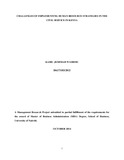| dc.description.abstract | HR strategy is concerned with contributions human resource strategies make to organizational
effectiveness. HR Strategic practices enhance employee productivity. Integrating human
resource practices into strategic planning process enables an organization to achieve its goals and
objectives. To be successful, firms must closely align their human resource strategies and
programs with environmental opportunities, business strategies and the organizations unique
characteristics and distinctive competences. Human resource functions in the Kenyan Civil
Service are concentrated in the Public Service Commission. As a central agency, it is imperative
that the commission has a commanding knowledge of the strategy, execution plan and level of
implementation for each ministry and State Department, and this is not realistic. The study
sought to find out the challenges of implementing HR Strategies in the Civil Service in
Kenya.The study was carried out using a descriptive cross sectional survey design. The target
population for this study is five (6) of the eighteen (18) Ministries in the republic of Kenya. The
study used primary data to be collected through questionnaires. The researcher used descriptive
statistics to analyze the data. These included frequencies, percentages, means and standard
deviation. Data was presented in form of tables and graphs. The study found out that the
organizational culture of the ministries is based on seniority and not healthy for the
implementation of HR strategies especially performance based systems; rigid organizational
culture which has made implementation of strategy difficult; closed and has impacted negatively
on the implementation of organizational strategies.The study also found out that financial/cost
implications have an influence in the successful implementation of HR strategies in the
organization. The study concluded that the ministries regard their human resource as a critical
component for service delivery and they value the human resource. The study also concluded
that the organizational culture of the ministries is based on seniority and not healthy for the
implementation of HR strategies especially performance based systems and there is a rigid
organizational culture in the ministries which has made implementation of strategy difficult. The
study also recommends that the study recommends that before implementing the HR strategies,
the HR department in the ministries should ensure that the strategies are well documented,
evaluated for any issues and tested before they are implemented. The study further recommends
that the top management should offer support and adequate resource allocation for the
implementation of HR strategies | en_US |

